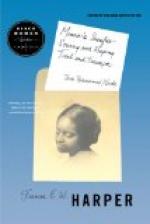The court in which Mrs. Harcourt lived was not a very desirable place, but, on account of her color, eligible houses could not always be obtained, and however decent, quiet or respectable she might appear on applying for a house, she was often met with the rebuff, “We don’t rent to colored people,” and men who virtually assigned her race the lowest place and humblest positions could talk so glibly of the degradation of the Negro while by their Christless and inhuman prejudice they were helping add to their low social condition. In the midst of her unfavorable environments Mrs. Harcourt kept her home neat and tidy; sent Annette to school constantly and tried to keep her out of mischief, but there was moral contagion in the social atmosphere of Tennis Court and Annette too often succumbed to its influence; but Annette was young and liked the company of young girls and it seemed cruel to confine the child’s whole life to the home and schoolhouse and give her no chance to be merry and playful with girls of her own age. So now and then grandmother Harcourt would let her spend a little time with some of the neighbors’ girls but from the questions that Annette often asked her grandmother and the conversations she sometimes repeated Mrs. Harcourt feared that she was learning things which should only be taught by faithful mothers in hours of sacred and tender confidence, and she determined, even if it gave offence to her neighbors, that she would choose among her own friends, companions for her granddaughter and not leave all her social future to chance. In this she was heartily aided by Mrs. Lasette, who made it a point to hold in that neighborhood, mothers’ meetings and try to teach mothers, who in the dark days of slavery had no bolts nor bars strong enough to keep out the invader from scattering their children like leaves in wintry weather, how to build up light and happy homes under the new dispensation of freedom. To her it was a labor of love and she found her reward in the peace and love which flowed into the soul and the improved condition of society. In lowly homes where she visited, her presence was a benediction and an inspiration. Women careless in their household and slatternly in their dress grew more careful in the keeping of their homes and the arrangement of their attire. Women of the better class of their own race, coming among them awakened their self-respect. Prejudice and pride of race had separated them from their white neighbors and the more cultured of their race had shrunk from them in their ignorance, poverty and low social condition and they were left, in a great measure, to themselves—ostracised by the whites on the one side and socially isolated from the more cultured of their race on the other hand. The law took little or no cognizance of them unless they were presented at its bar as criminals; but if they were neither criminals nor paupers they might fester in their vices and perpetuate their social condition.




